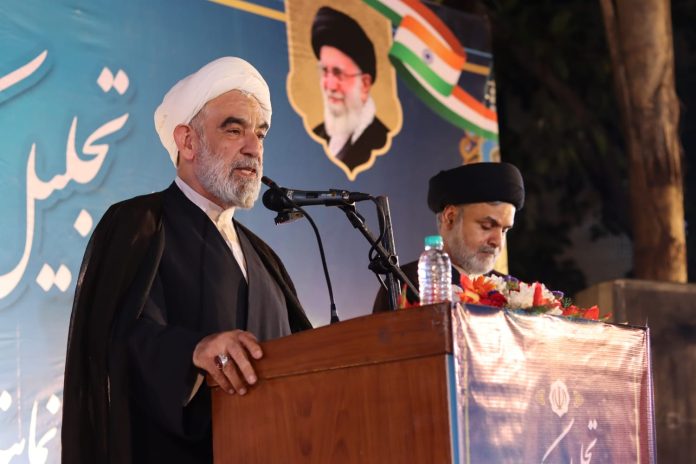In a heartfelt event at the Iran Culture House in New Delhi, Ayatollah Agha Muhsin Qummi, Head of International Relations at the Office of Iran’s Supreme Leader, addressed an esteemed gathering to mark a symbolic moment in Indo-Iranian religious relations. The ceremony welcomed Hojjat Al Islam Wal Muslimeen Haj Agha Abdul Majeed Hakeem Elahi as the new Representative of the Supreme Leader of the Islamic Republic of Iran in India and honored the 15-year service of his predecessor, Hojjat Al Islam Wal Muslimeen Haj Agha Mahdi Mahdavipour.
In his address, Ayatollah Qummi described the Indo-Iranian relationship as a “sacred, spiritual, and civilizational bond that has withstood the tests of time.” Beginning his speech with salutations upon Prophet Muhammad ﷺ and the Ahlul Bayt, he emphasized the shared Islamic heritage that deeply connects the people of India and Iran.
He praised the newly appointed representative, Hakeem Elahi, as a man of humility and deep scholarship, chosen by Ayatollah Sayyid Ali Khamenei for his sincerity and commitment to Islamic values. “India is a diverse land where the representative must nurture unity, convey the message of the Ahlul Bayt (AS), and serve the community with wisdom and love,” Qummi stated.
The event also paid a moving tribute to outgoing representative Mahdi Mahdavipour, whose tenure was hailed as a “golden era” for religious scholarship and cultural exchange. Qummi lauded his tireless efforts in supporting Shia institutions, building educational centers, encouraging interfaith dialogue, and connecting with communities across Indian cities like Lucknow, Hyderabad, Mumbai, and Delhi.
“His work was never limited to ceremonial duties. He was a teacher, a brother, and a spiritual guide. His mission was to awaken hearts and minds with sincerity,” Qummi noted, reflecting on Mahdavipour’s impactful legacy.
Ayatollah Qummi urged the Indian Muslim community, scholars, and leaders to support the new representative in continuing this legacy of service and education. “Our mission is not about positions or prestige, but about hearts, guidance, and faith,” he stressed.
The ceremony concluded with prayers and appreciation from the audience, which included diplomats, scholars, students, and members of the Indian Shia community. The message was clear: while representatives may change, the divine responsibility of nurturing faith and unity remains unchanged.
This ceremony marked not just a transition of leadership but a reaffirmation of the enduring bond between the Islamic Republic of Iran and the Indian Muslim community—a relationship built on spirituality, mutual respect, and shared heritage.




